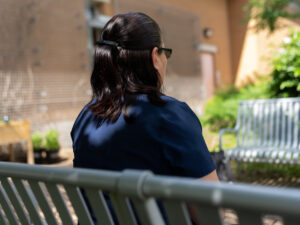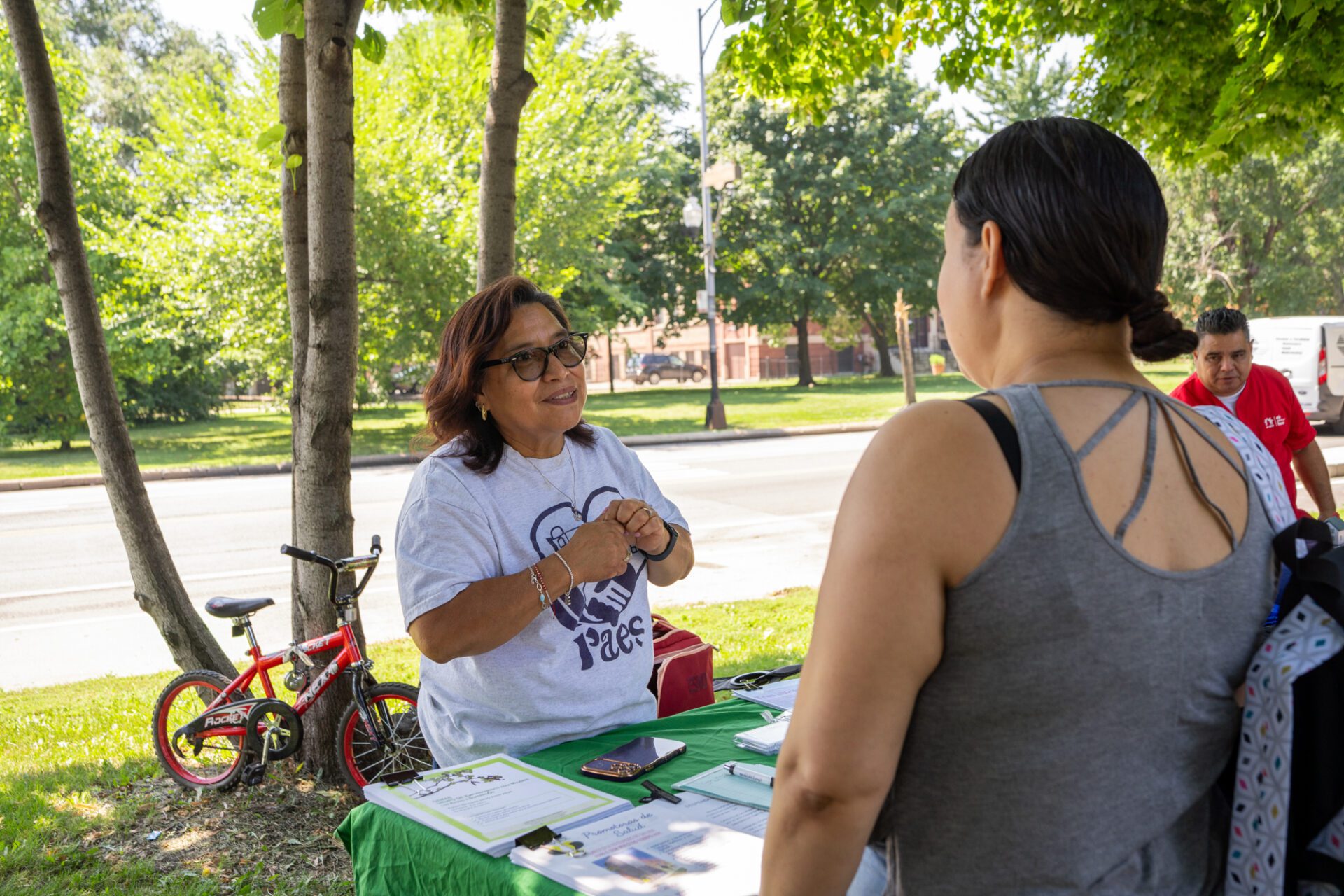 Camilla Forte/Borderless Magazine/Catchlight Local/Report for America
Camilla Forte/Borderless Magazine/Catchlight Local/Report for AmericaMientras miles de inmigrantes pierden el acceso a la atención médica financiada por el estado, estas promotoras se aseguran de que se atiendan las necesidades médicas de los residentes de La Villita.
Cuando Sahida Martínez emigró a Estados Unidos desde México hace más de 25 años, pensó que sus perspectivas laborales serían limitadas.
La exmaestra de secundaria le preocupaba que la barrera del idioma y su licenciatura en un país extranjero le dificultaran encontrar trabajo.
En ese momento, su marido la animó a quedarse en casa y cuidar de sus hijos mientras se adaptaban a la vida en Chicago. Así lo hizo durante 16 años, pero anhelaba regresar al trabajo.
Noticias que ponen el poder en el punto de mira y a las comunidades en el centro.
Suscríbase a nuestro boletín gratuito y reciba actualizaciones dos veces por semana.
Fue entonces cuando encontró Enlace Chicago y se convirtió en su primera promotora de salud.
Este año cumple 10 años trabajando como promotora de salud en Enlace, una organización comunitaria que ofrece apoyo integral a los residentes de La Villita, en el suroeste de Chicago.
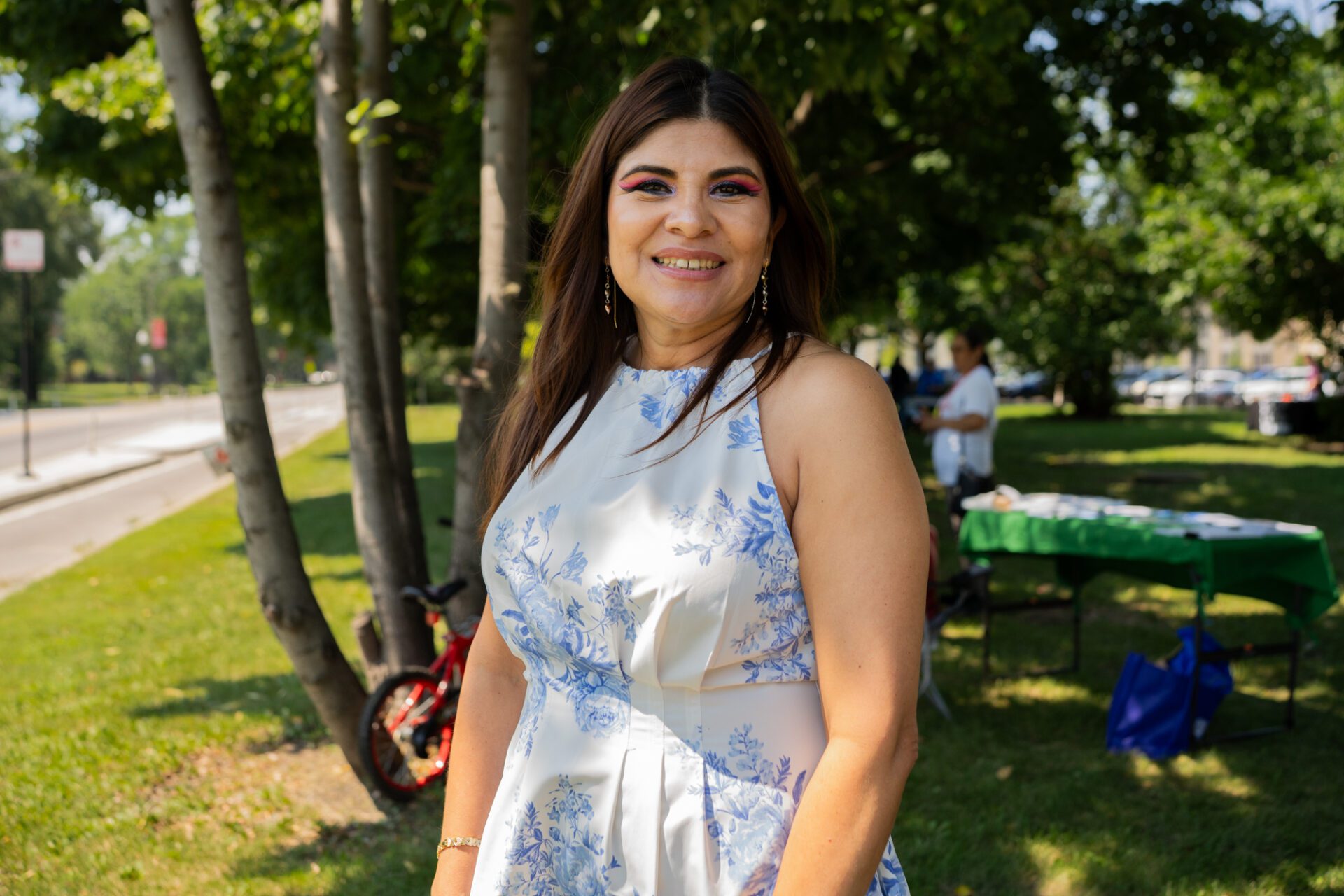
"Aprendimos que no sólo los niños necesitan acceso a la atención médica", recuerda Martínez sobre los primeros días. "Es muy importante que los padres también... tengan acceso a la atención médica".
Durante la última década, promotoras de salud de Enlaceo trabajadoras comunitarias de salud, han estado tocando puertas, organizando talleres y participando en eventos en el vecindario para educar a la comunidad sobre cómo mejorar las desigualdades de salud. Estas mujeres se han convertido en coordinadoras de los recursos de salud más importantes en el vecindario, una función que, según ellas, es vital después de que los inmigrantes indocumentados perdieron acceso al programa de atención médica de Illinois y el aumento en la aplicación de las leyes de inmigración de Trump.
"Nuestro trabajo es darle poder a la comunidad".
Organizaciones locales como Enlace Chicago han contado con las promotoras para generar confianza con las comunidades latinas, así como para informar sobre los recursos disponibles y ofrecerlos. Estas trabajadoras comunitarias de salud suelen ser inmigrantes y madres, y algunas tienen experiencia profesional en atención médica en sus países de origen.
"Una promotora es una persona que habla el mismo idioma que los demás en la comunidad", dijo Martínez. "Como vivimos en la comunidad, tenemos necesidades similares".
En la década de 1960, el modelo de las promotoras surgió en América Latina para capacitar a las mujeres sobre las necesidades médicas. En los años siguientes, el modelo se ha extendido más allá de las fronteras.
En 2024, investigadores encontraron que los trabajadores comunitarios de salud comunitarios ayudaron a mejorar la salud de las poblaciones socioeconómicamente desfavorecidas, citando las relaciones estrechas con las comunidades locales y el conocimiento general de los recursos de atención médica.
"Los trabajadores de salud comunitarios (CHWs, por sus siglas en inglés) ofrecen servicios de salud culturalmente informados que son curativos y transformadores, y su trabajo promueve reformas en las políticas de salud que motivan la equidad a través de un cambio incremental y constante", según un estudio en 2022 publicado en el AMA Journal of Ethics.
Elizabeth Oviedo se convirtió en promotora de tiempo completo en Enlace en 2020. Fue enfermera pediátrica durante 18 años en México antes de emigrar a los Estados Unidos y obtuvo su certificado de trabajadora de salud comunitaria a través de Enlace.
Ahora dice que le gusta más trabajar en la prevención de enfermedades en la comunidad en lugar de cuidar a las personas una vez que están enfermas.
"Lo que me motiva es ayudar a la gente", dijo. "Me motiva ayudar a la gente a encontrar recursos y hacerles saber que no tienen por qué asustarse si algunos recursos desaparecen, y hacerles saber que hay otros lugares donde pueden buscar".
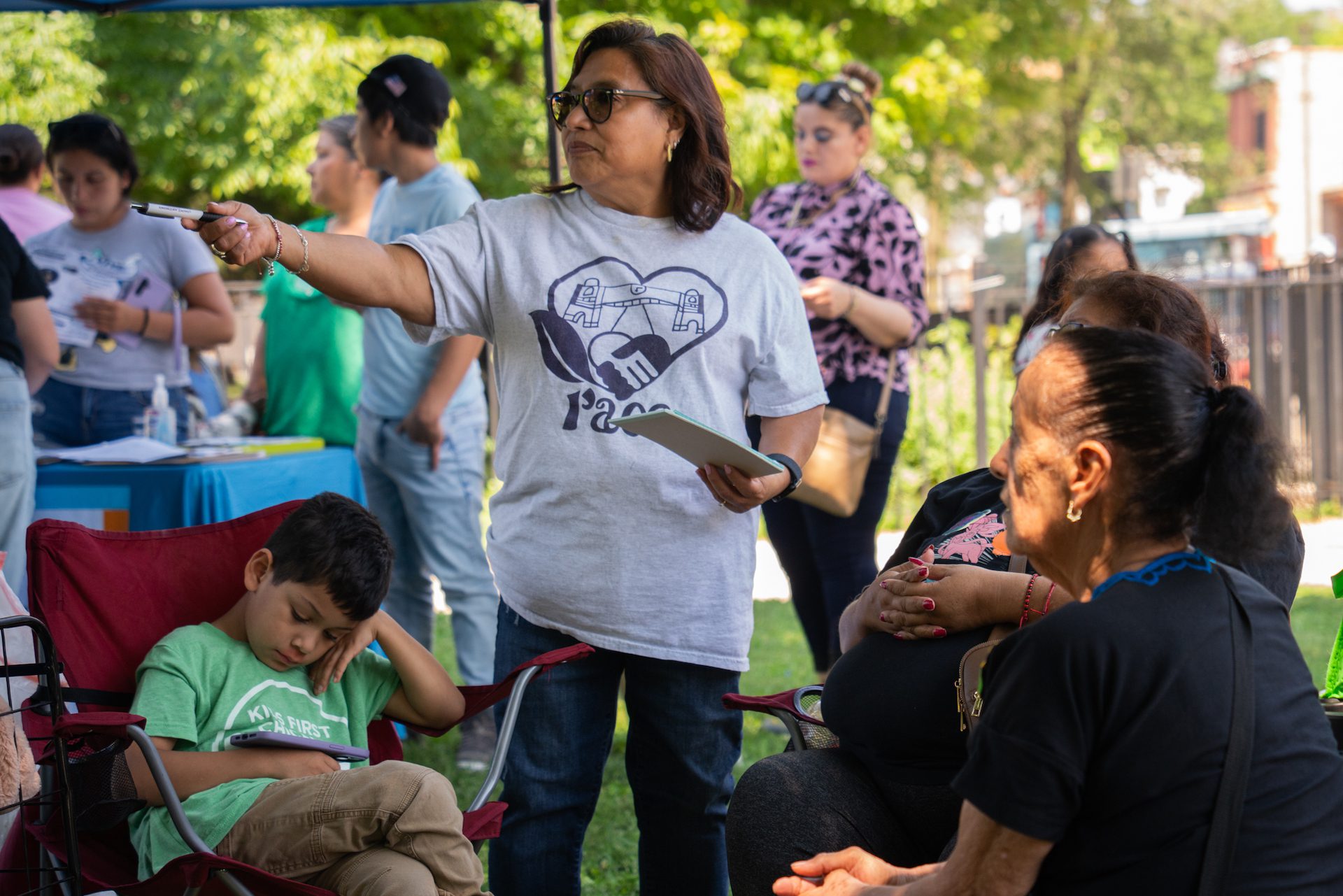
Dentro de Enlace, Oviedo inició un grupo de apoyo de salud mental para mujeres que se enfoca en la ansiedad y la depresión.
Además de los recursos relacionados con la salud, las promotoras de Enlace apoyan a las nuevas familias en su proceso de adaptación a la vida en Estados Unidos.
"Nuestro trabajo es dar poder a la comunidad, no sólo haciendo este trabajo sino también mostrando a la gente sus derechos", dijo Martínez. "Tenemos que tener recursos para dar a la gente".
Durante la última década, el programa Promotoras de Salud de Enlace ha evolucionado y ha abogado por la creación de un programa de certificación de trabajadores de salud para hispanohablantes. Martínez dijo que desde entonces varias docenas de personas se han graduado del programa de certificación en español.
En los lados sur y oeste de Chicago, los trabajadores de salud de la comunidad han desempeñado un papel esencial en la comprensión de las necesidades de los vecinos.
Hace unos 12 años, Promotoras de Salud de Brighton Park Neighborhood Council (BPNC) comenzó con un grupo de madres involucradas en las escuelas de sus hijos. En la actualidad, BPNC cuenta con seis promotoras de salud que trabajan todo el año, asistiendo a eventos de recursos comunitarios y a las escuelas y recorriendo el vecindario.
Carmen Barragán, organizadora principal de BPNC que administra el programa de trabajadores de salud comunitarios, llama a las promotoras en capacitación "diamantes que aún no se han pulido".
El programa guía a los residentes que obtienen su certificación de trabajador comunitario de salud para convertirse en promotores. También proporciona educación sobre temas de salud y capacitación mensual.
"Todos nuestros promotores de salud están creciendo como líderes, y nosotros los estamos apoyando en todo momento", dijo Maricela Bautista, subdirectora de organización y servicios para jóvenes en BPNC.
"Hemos sido más proactivos con las relaciones que establecemos en la comunidad" ella dijo. “Estamos conectando con los miembros de la comunidad donde se encuentren”.
Conectando a los residentes con servicios médicos
La pandemia de COVID-19 presento una necesidad inmensa de trabajadores de salud en una comunidad que continuamente mostró algunos de los números más altos de personas contagiadas y muertes.
En su primera semana de pruebas, Proyecto Vida, una organización de salud comunitaria con sede en La Villita, encontró que 80% de las personas sometidas a la prueba de COVID-19 no tenían seguro médico.
Según datos médicos copilados por la ciudadlos vecindarios en las zonas suroeste y noroeste, con altas poblaciones de inmigrantes, registran las tasas más altas de personas sin seguro, algunas casi duplican el promedio de la ciudad.
Tras los esfuerzos de la comunidad y la implementación por parte del estado del programa Health Benefits for Immigrant Adults en 2021, la tasa de adultos asegurados de la comunidad pasó de 35 a 82%. Sin embargo, es posible que haya más personas sin seguro ahora que 30.000 inmigrantes indocumentados en todo el estado perdieron cobertura médica en julio.
Durante la pandemia, los trabajadores de salud comunitarios fueron una parte importante del ecosistema de salud. En Brighton Park, la vecindad registró menos casos positivos de COVID-19 que el promedio de la ciudad, según datos de la ciudad.
"Los promotores de la salud desempeñaron un papel vital ayudando a la comunidad a vacunarse", dijo Bautista.
En La Villita y Pilsen, la presencia prolongada de los trabajadores de salud comunitarios en sus comunidades ha hecho que sean caras conocidas para las familias y los grupos comunitarios de el area, dijo Martínez.
Barragán se hizo eco de este sentimiento.
"Los miembros de nuestra comunidad se ven reflejados en nosotros", dijo.
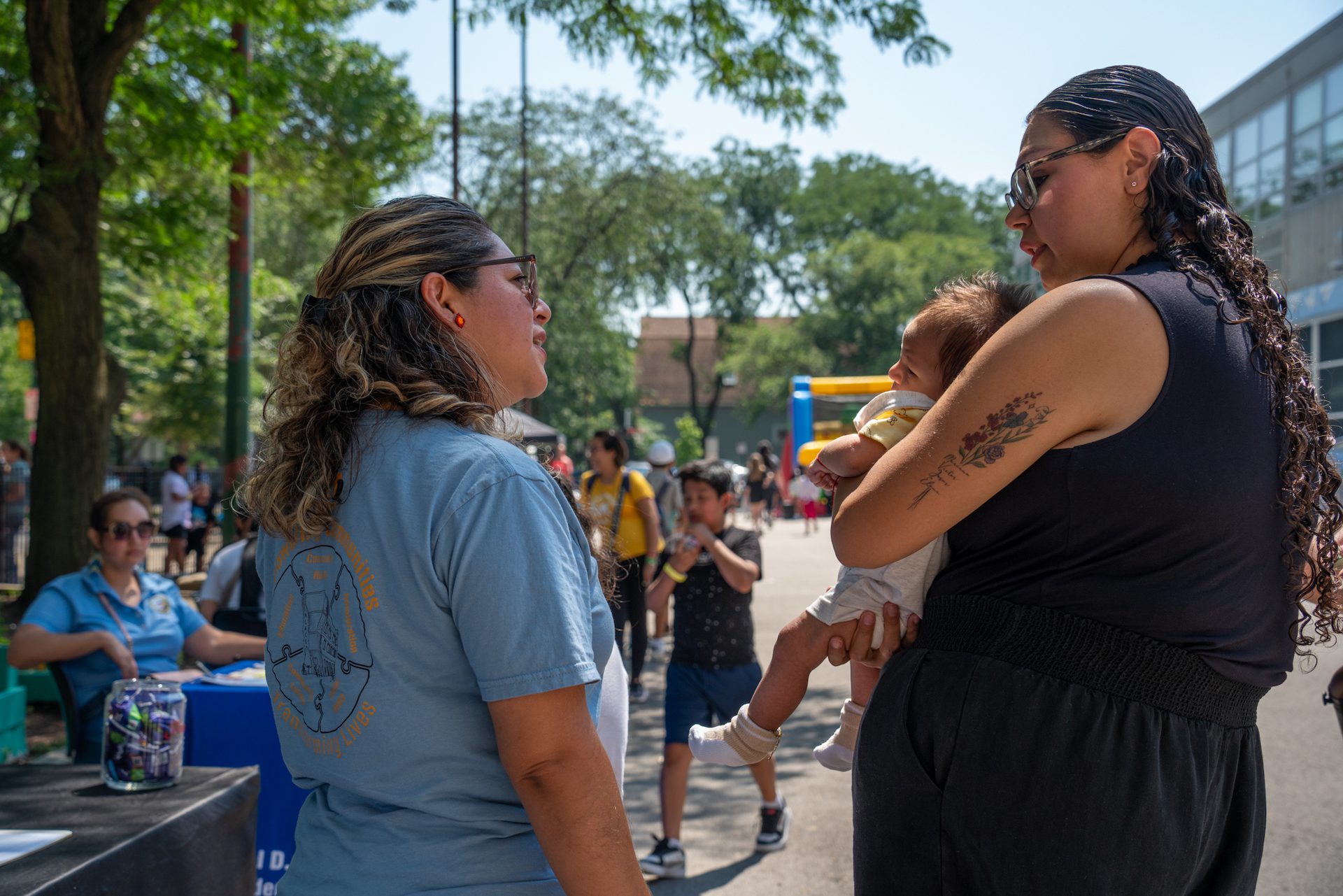
Para apoyar su misión, las promotoras de organizaciones locales como Enlace a menudo se asocian con CommunityHealth, una clínica de salud gratuita que atiende a personas de bajos ingresos y con seguro insuficiente en Chicago.
Además de conectar a los residentes con servicios de atención médica como mensajeras de la comunidad, las promotoras de salud también desempeñan un papel importante ayudando a las personas a navegar por los sistemas de atención médica complicados y actualizarlos sobre las políticas esenciales, dijo Paola Seguil, directora de operaciones de CommunityHealth.
"También asisten regularmente a eventos, difunden información de forma proactiva entre las personas elegibles y se mantienen al tanto de los cambios constantes en las pólizas de atención médica”, explica Seguil.
En los últimos meses, Enlace y BPNC han modificado sus estrategias ante los nuevos recortes de Medicaid, el fin del programa Health Benefits for Immigrant Adults (HBIA)y los cambios radicales de Trump en la política de inmigración.
Martínez dijo que Enlace ha experimentado una disminución en las llamadas debido a los temores centrados en el estatus legal de los residentes.
"Ya no quieren solicitar ningún tipo de programa", dijo. "En nuestra comunidad, la gente nos ha dicho que prefiere no salir y quedarse en casa para evitar encontrarse con ICE".
Ambas organizaciones siguen organizando y llevando a cabo ferias semanales de recursos comunitarios.
Los trabajadores comunitarios de salud de BPNC han estado recorriendo las vecindades para proporcionar información sobre atención médica y beneficios de SNAP. La organización también ha estado capacitando a sus promotoras para reaccionar ante posibles redadas de ICE en eventos para garantizar su seguridad y la de los miembros de la comunidad.
Las promotoras de salud no han bajado la guardia en sus esfuerzos por ayudar a sus comunidades, dijo Martínez. Como trabajadores de primera línea, se aseguran de que los residentes del lado suroeste descubran los recursos disponibles, dijo.
"Te olvidas de que tienes un poder", dijo Martínez. "Y este es uno de mis poderes: ayudar a mi comunidad".
Este informe ha sido financiado en parte por el Medill Solutions Journalism Hub de la Northwestern University y la campaña Alliance Matters, una iniciativa de la Chicago Independent Media Alliance (CIMA) y la Field Foundation.
Tara Mobasher es becaria de Northwestern Medill en Borderless Magazine. Puede ponerse en contacto con ella en [email protected].
Aydali Campa es miembro de 'Report for America Corps' y cubre temas de justicia medioambiental y comunidades inmigrantes para Borderless Magazine. Envíale un correo electrónico a [email protected].
